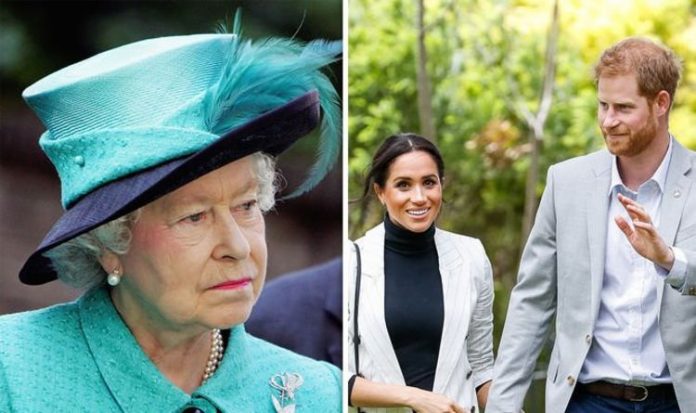Harry and Meghan have caused an international stir this week after appearing together for the first time on public TV to implore the American electorate to vote. The Duke of Sussex urged people in the US to “reject hate speech” and have their say in the upcoming presidential elections. Meghan, who is a US citizen, also said this was the “most important election of our lifetime”, and has spoken out several times in recent weeks encouraging people to hit the ballot box.
As both are still known as the Duke and Duchess of Sussex and Harry is sixth in line to the throne, royal fans are up in arms at the couple’s political move.
Although no names were mentioned, some believe the couple were showing a partisan stance and therefore violating the political neutrality that comes with the constitutional monarchy.
Yet, a Buckingham Palace spokesman spoke out and distanced the Firm from his remarks.
They explained: “The Duke is not a working member of the Royal Family and any comments he makes are made in a personal capacity.”
Still, this is not the first time Harry has risked the Queen’s outrage by stepping over the royal line during his relationship with Meghan.
In 2016, Harry reportedly missed his flight back to London from his Carribean tour, and chose to visit his then-girlfriend in Canada.
Kensington Palace had explicitly stated Harry was to fly straight back to London in order to attend his royal engagements in the UK, according to reports, but the royal cancelled his seat on his British Airways flight home.
He chose to make a 1,700-mile detour to Toronto instead, where Meghan was working as an actress for the US TV show, ‘Suits’.
READ MORE: Meghan Markle biography exposes critical question in legal case
Back in 2016, The Telegraph reported: “The Prince’s decision to visit Miss Markle, whom he had not seen for three weeks, defied the official Royal Household policy that members of the Royal Family should not combine personal trips with official business.
“In 2004, after the Duke of York had been criticised for combining official business with golfing breaks, the Royal Household assured the National Audit Office that such behaviour would stop.”
After Prince Andrew faced public backlash in 2004, the Royal Household set a precedent by stating: “Members of the Royal Family are entitled to grant-in-aid for official travel, as are their staff and, where capacity permits, other officials.
DON’T MISS
‘Isolated’ Prince Harry’s birthday plan sparked questions over guests [INSIGHT]
Meghan Markle’s struggles ‘stem from Princess Margaret’s affair’ [EXPLAINED]
Prince Harry’s key characteristic exposes real reason for US move [EXPOSED]
To find out details of coronavirus in your area, please fill in your postcode below.
“They meet their own costs, however, for private travel. In order to avoid confusion, combining private and public engagements in the same trip is actively discouraged.”
As Harry’s return flight from the Caribbean was cancelled and he instead went straight to Canada, he technically combined his private and public engagements and risked upset behind Palace walls.
The Telegraph also pointed out that Harry risked criticism over the use of taxpayers’ money at the time.
While Harry did pay for his own ticket to Canada, according to the newspaper, the cost of diverting at least one police protection officer to Toronto was still to be “met by the taxpayer”.
It was unclear whether Kensington Palace claimed a refund over his cancelled ticket, too.
He had been unable to contact Meghan while on his Caribbean tour of the seven nations for up to 20 hours at a time and had not seen her for three weeks.







